Without hand shakes, Donald Trump and Hillary Clinton faced off in the third and final presidential debate Wednesday at the University of Nevada, Las Vegas.
- Trump won’t promise he’ll accept election results
- Times judges score the debate: Clinton is the winner — again
- Times journalists annotated a transcript of the nastiest exchanges
- Later-term abortions, as described by Trump, are extremely rare
- Play the race to 270 electoral votes
- Share via
Trump’s refusal to say he would accept the election result is different from the 2000 Bush vs. Gore recount
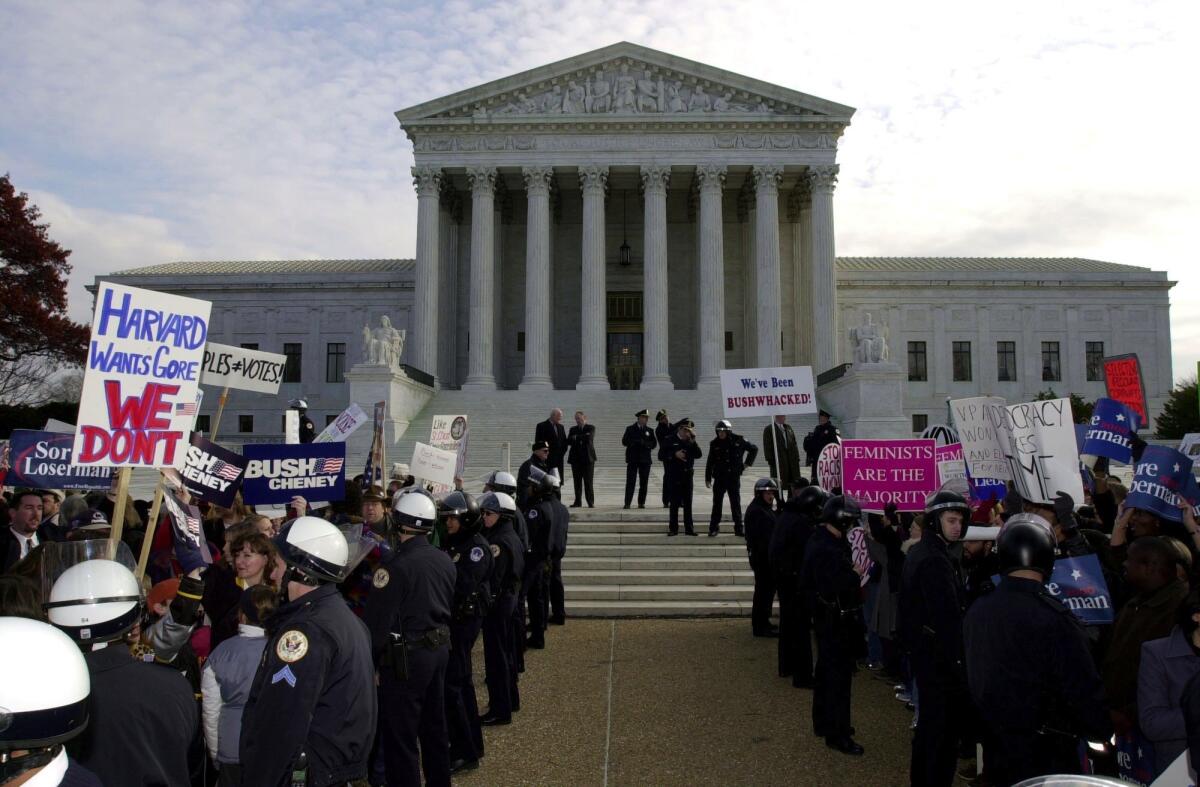
The headline of Wednesday night’s debate was when Donald Trump refused to say he would accept the election’s outcome. Critics of the GOP nominee, including members of his own party, said it was further evidence Trump was upending a bedrock of American democracy: the peaceful transfer of power.
But Trump’s supporters hit back, pointing to the recount in the 2000 contest between George W. Bush and Al Gore.
Trump’s words are markedly different from what took place 16 years ago.
As polls have increasingly turned against Trump, he has stepped up claims that the election is “rigged,” which critics argue is laying the groundwork for contesting the election. Gore never questioned the election results before the voting concluded.
On election night in 2000, the television networks called Florida for Bush, ostensibly giving him the electoral votes to win the White House. Gore called Bush to concede, but when the networks realized Florida was too close to call, they rescinded Bush’s win there.
Gore took back his concession. Florida state law mandated a recount because of how close the vote was.
Gore sought hand recounts in a handful of counties; Bush sued to stop them. Pictures of elections officials scrutinizing paper ballots filled the airwaves, and a legal battle ensued.
Ultimately, Bush took the matter to the Supreme Court, which stopped the recount. Gore said he disagreed with the decision but conceded the race.
Here’s a recounting by veteran Associated Press reporter Jim Kuhnhenn.
Republican strategists who worked for Bush, albeit critical of Trump, back up this account.
- Share via
About that Pew report Trump uses to suggest voter fraud
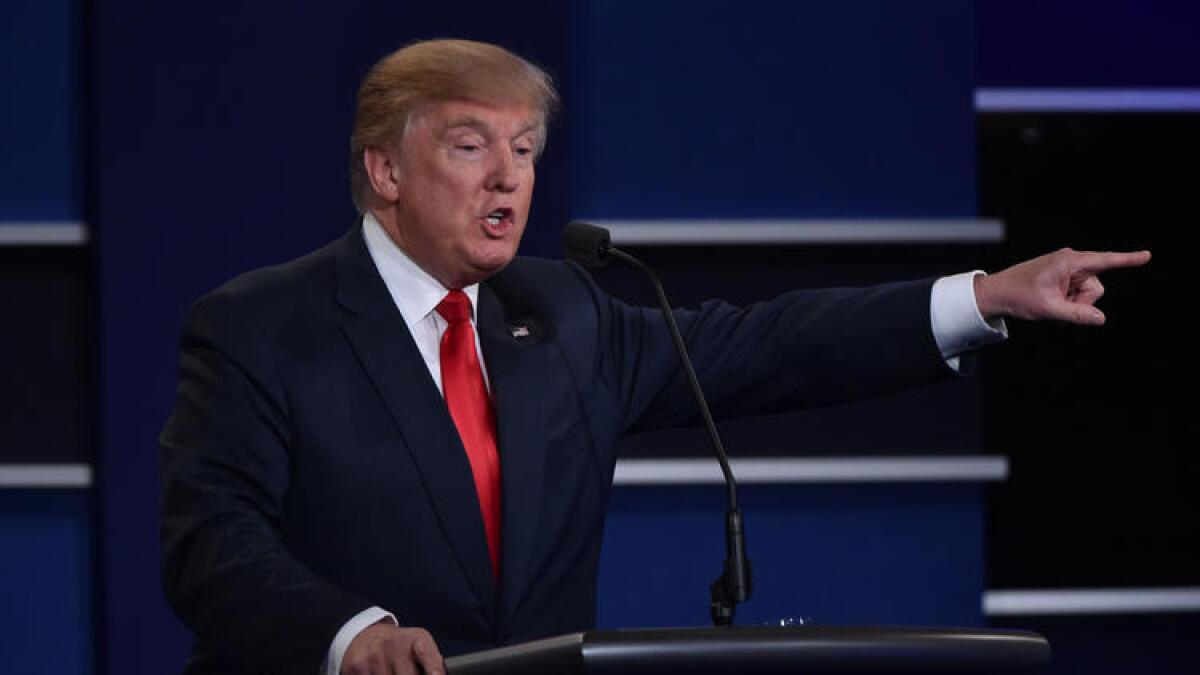
When questioning the integrity of the election and suggesting he might not accept the result come Nov. 9, Donald Trump claimed widespread voter fraud.
A close look at the transcript finds the Republican nominee specifically putting that figure on Pew.
“If you look at your voter rolls, you will see millions of people that are registered to vote -- millions, this isn’t coming from me -- this is coming from Pew report and other places -- millions of people that are registered to vote that shouldn’t be registered to vote,” he said.
Over the last several weeks, Trump has been referencing this 2012 Pew report to back up his claims the election could be “rigged” thanks to those “millions” registered to vote who shouldn’t be.
It’s titled “Inaccurate, Costly, and Inefficient: Evidence That America’s Voter Registration System Needs an Upgrade.”
Page one of the 12-page report has several bullet points:
- Approximately 24 million—one of every eight—voter registrations in the United States are no longer valid or are significantly inaccurate.
- More than 1.8 million deceased individuals are listed as voters.
- Approximately 2.75 million people have registrations in more than one state.
FactCheck.org examined the report and found Trump has been citing it inaccurately on the campaign trail.
“The report did not allege the 1.8 million deceased people actually voted. Rather, Pew said that it is evidence of the need to upgrade voter registration systems,” the organization wrote.
One thing that didn’t come up during the debate is something we wrote about this week: GOP officials oversee voting in most of the states.
Here’s our own fact-check about voter fraud.
- Share via
Clinton: Trump is blaming the system again by refusing to say he’ll accept election results
Hillary Clinton, looking confident after her performance in the final presidential debate, seized early Thursday on Donald Trump’s suggestions that he may not accept the outcome of the election.
“It was horrifying what he said on the debate stage tonight,” Clinton told journalists traveling on her campaign plane. “Our country has been around for 240 years, and ... one of our hallmarks has always been we accept the outcome of our elections.”
Trump demurred when asked during Wednesday’s debate whether he would accept the results of the vote.
“What he said tonight is part of his whole effort to blame somebody else for his campaign,” Clinton said. “As I said, when he is losing, he blames the system — whatever the system, whether it is being in court over Trump University or losing the Iowa caucus and Wisconsin primary and losing Emmys, for goodness’ sake. He says it is rigged against him.”
Clinton also took aim at Trump’s hesitance to condemn Russian President Vladimir Putin for his government’s suspected involvement in the hacking of Clinton campaign chairman John Podesta’s email.
Trump initially said he is not convinced that evidence has proved Russia was involved. Pressed on the matter, Trump said he would condemn such involvement if it were proved.
“I was very concerned that even now, after 17 intelligence agencies in our government, both military and civilian, have confirmed that Russia has engaged in cyber attacks against Americans, that he refused to admit that it’s true and condemn it for what it is — which is a blatant effort to try to interfere in our election,” Clinton said.
Asked how she felt about Trump calling her a “nasty woman”, Clinton said she brushed it off.
“I just didn’t pay any attention to that,” she said.
Clinton began her exchange with reporters with a sarcastic remark about naps — a reference to Trump’s claim that she had spent the run-up to the presidential debates resting rather than preparing.
“We have finished our last debate,” Clinton said. “I am feeling both relieved and very grateful. ... No more debates. No more naps.”
- Share via
The last debate was Trump’s best debate, and other things we learned
He made the case for change and talked about trade and the economy. He forced Clinton to squirm a bit as she tried to defend perceived conflicts of interest involving the Clinton Foundation.
But Trump also ensured that one of the most talked-about moments would be his refusal to agree to abide the election results, an issue that could keep many voters from moving to his corner.
- Share via
Trump will accept the results of the election because he’ll win, campaign manager says after the debate
After spending the last few weeks claiming without evidence that the November election will be “rigged” in favor of Democratic nominee Hillary Clinton, Donald Trump was asked directly by Fox News anchor and debate moderator Chris Wallace if he would concede should he lose to Clinton.
“I will look at it at the time,” Trump said. When pressed moments later, Trump added simply: “What I’m saying is that I will tell you at the time. I will keep you in suspense.”
Kellyanne Conway, his campaign manager, at first responded to questions about the comment by saying he “would accept the results because he’ll win the election.”
“So, you know, absent widespread fraud and irregularities, then, we’ll see,” Conway said. “What he’s saying is we have to see what happens.”
The Republican National Committee will accept the results of the general election even if Donald Trump doesn’t, said RNC spokesman Sean Spicer. He says, “We’re going to respect the will of the people.”
Spicer addressed Trump’s explosive comment after the debate. He said it likely won’t be an issue because Trump will win.
When pressed, Spicer said, “I cannot speak for what he thinks.”
For his part, Trump tweeted that he was proud of his performance, but didn’t show up in the spin room or make a statement after the debate. He’s on his way to Ohio.
- Share via
Hillary Clinton after the debate: ‘We are a better country than Donald Trump is’
After the debate, Hillary Clinton made a beeline for a campaign event in North Las Vegas, her motorcade taking her past the Las Vegas Strip to a park where more than 5,000 supporters had been watching her spar with Donald Trump on a massive screen in an open-air amphitheater.
“We are a better country than Donald Trump is,” Clinton said after taking the stage with her husband.
Clinton was introduced in Spanish by Mexican singer Vicente Fernandez, and she urged the largely Latino crowd to help her defeat Trump.
She repeated one of her attack lines from the debate, mentioning that half of immigrants who are in the country illegally pay federal income taxes.
“You know what that means? That means you pay more to support this country than Donald Trump pays. You are supporting our military, and our veterans, and our roads, and our healthcare, and our education. And I want to say thank you. Thank you for your hard work.”
Bill Clinton joined his wife onstage, and they put their arms around each other.
“I want you to know that our family will support your family,” Hillary Clinton said.
- Share via
Questions of conflicts aside, Hillary Clinton says she’s proud of Clinton Foundation

Challenged about ethical questions at the Clinton Foundation, Hillary Clinton cited work in Haiti and around the world.
Hillary Clinton defended the work of the Clinton Foundation during Wednesday’s debate, brushing aside questions about conflicts and criticisms from Donald Trump.
The sprawling foundation, which works on challenges in the developing world and in the U.S., has drawn criticism for accepting gifts from foreign countries and businesses with international interests while Clinton served as secretary of State.
“Everything I did as secretary of State was in furtherance of our country’s interests and values,” Clinton said, saying there is “no evidence” of special handling for donors, but “a lot of evidence of the good work” done by the organization.
Trump took the opening to slam the foundation for accepting money from Middle Eastern countries such as Saudi Arabia.
“These are people who push gays off buildings; these are people who kill women and treat women horribly,” Trump said, calling on Clinton to give money back. He also criticized the foundation for its mixed record in Haiti, saying he got an earful about that during a tour of Miami’s Little Haiti neighborhood.
“Let me tell you, they hate the Clintons because of what happened in Haiti,” he said.
Clinton said she would be happy to match her foundation with Trump’s, which she noted used some of its funds to buy a portrait of Trump, and is under investigation for improperly raising money.
The Clinton Foundation was created in 1997, while Bill Clinton was still in office, to build the Clinton presidential library in Little Rock, Ark.
Since then, it has grown into a worldwide health and development organization, with a range of interests and projects as diverse as planting trees and promoting healthy school lunches.
Among its goals, the foundation seeks to promote worldwide economic growth, increase opportunities for women and girls, fight childhood obesity and ameliorate the effects of climate change.
The foundation has raised about $2 billion from wealthy individuals, corporations and foreign governments. Its efforts, including disaster relief and providing low-cost medicines, have helped save millions of lives.
Despite assertions to the contrary, the foundation is not a money-making enterprise for the Clinton family. The former president, his wife and their daughter, Chelsea, receive no salary from the foundation, which spends 80% to 90% of its expenditures on charitable programs.
Much of the controversy surrounds the foundation’s fundraising and allegations that donors — including foreign governments that gave millions — traded contributions for access to Clinton when she was secretary of State during President Obama’s first term.
To address those concerns, the foundation had signed a memorandum of understanding in December 2008 with Obama’s transition team promising to publicly report its donors, though not specifying how much they have given.
Hillary Clinton also signed a separate ethics agreement with the State Department.
The Clintons, however, rejected suggestions at the time they ban all foreign donations to, at the least, avoid the appearance of a conflict of interest. And emails showed they did did not always keep operations as separate from State Department affairs as they had promised.
Hillary Clinton met with some of the foundation’s donors and others in the Clintons’ orbit reached out to the secretary of State seeking opportunities for some givers.
There has been no evidence, however, of any explicit quid pro quo.
Bill Clinton has said he will cut ties to the foundation if his wife wins in November. The foundation also announced that if Hillary Clinton wins it will stop taking new contributions from foreign and corporate donors.
- Share via
What are Trump and Clinton’s plans to stabilize Social Security? It’s not clear

Hillary Clinton and Donald Trump respond to a question about a “grand bargain” on entitlements.
Hillary Clinton and Donald Trump both sidestepped a question in Wednesday’s debate about how to stabilize Social Security to avert benefit cuts as funding dwindles in the decades ahead.
Both have vowed to oppose benefit cuts. But as moderator Chris Wallace pointed out, the Committee for a Responsible Federal Budget, a nonpartisan fiscal monitor, has concluded that neither candidate has a viable plan to shore up Social Security.
Wallace asked whether either of them would accept a “grand bargain” of tax hikes and benefit cuts to sustain Social Security and Medicare.
“I’m cutting taxes,” Trump answered. “We’re going to grow the economy. It’s going to grow at a record rate.”
Clinton vowed to use tax hikes on the wealthy to bolster Social Security and “enhance benefits for low-income workers and women who have been disadvantaged” by the current system.
The Committee for a Responsible Federal Budget analyzed both candidates’ fiscal plans and found that Clinton would increase the national debt by $200 billion over a decade and Trump’s would increase it by $5.3 trillion.
- Share via
Final debate scorecard: Hillary Clinton won. Again.
This may have been a relatively more sedate debate, but our judges still say — as with the last two debates — that Clinton emerged victorious. Here’s a review of every round:

Times judges give the victory to Hillary Clinton. Again. Full campaign coverage.
- Share via
Donald Trump is right: The U.S. did pay Iran $1.7 billion in cash

Clinton says Trump cried “crocodile tears” after shipping jobs overseas and buying foreign steel.
Yes. Donald Trump is right on this one.
The Obama administration allowed $1.7 billion in cash to go to Iran earlier this year. The money, however, was a settlement of a decades-old legal claim between the two countries. An initial payment of $400 million was handed over on Jan. 17, the same day Iran’s government agreed to release four American prisoners.
Obama administration officials had initially denied the two transactions were linked. But later, officials acknowledged the U.S. had withheld the cash to pressure Iran to move forward with the releases and guarantee the Americans were allowed to leave Iran.
The remaining $1.3 million, apparently interest on Iranian cash held in the U.S. since the 1970s,was handed over in two later payments in January and February.
- Share via
Debate scorecard: Judges give the last round to Hillary Clinton, but say it was close
Judge David Lauter says, “Most of this round wasn’t bad for Trump. But saying that he disagreed with Ronald Reagan is only going to worsen the problem he already has with Republican voters.” More of their thoughts on this tight round.
- Share via
Donald Trump offers graphic description of later-term abortion, but such procedures are extremely rare

Trump and Clinton debate Roe vs. Wade and the Supreme Court.
Using graphic terms, Donald Trump during Wednesday night’s debate described one of the most controversial, and exceedingly rare, abortion procedures: those that happen at the very end of pregnancies.
Trump said these terminations involve “rip[ping] the baby out of the womb of the mother just prior to the birth of the baby.”
He is most likely referring to the procedure known as “intact dilation and extraction,” which is sometimes called partial-birth abortion. This procedure, which is used for abortions in the third term of pregnancy as well as later-term miscarriages, involves dilating the woman’s cervix and pulling the entire fetus through the birth canal.
The procedure became a hot political topic during George W. Bush’s presidency, when Congress passed a bill banning “partial-birth abortions,” except for when the woman’s life is in danger. The Supreme Court upheld the ban in 2007.
Forty-three states impose certain restrictions on some abortions after a certain point in pregnancy.
Only 1.3% of abortions performed in the United States occur after the 21st week of pregnancy, according to the Guttmacher Institute, a think thank that supports abortion rights. The vast majority — 91% of abortions performed in 2012 — occur in the first 13 weeks.
Although Trump has asserted his antiabortion beliefs in this campaign, he used to be in favor of abortion rights. When asked in 1999 by Tim Russert about the procedure, he said he was “pro-choice in every respect” and would not ban partial-birth abortions.
- Share via
Trump and Clinton clash over border security and U.S.-Mexico relations
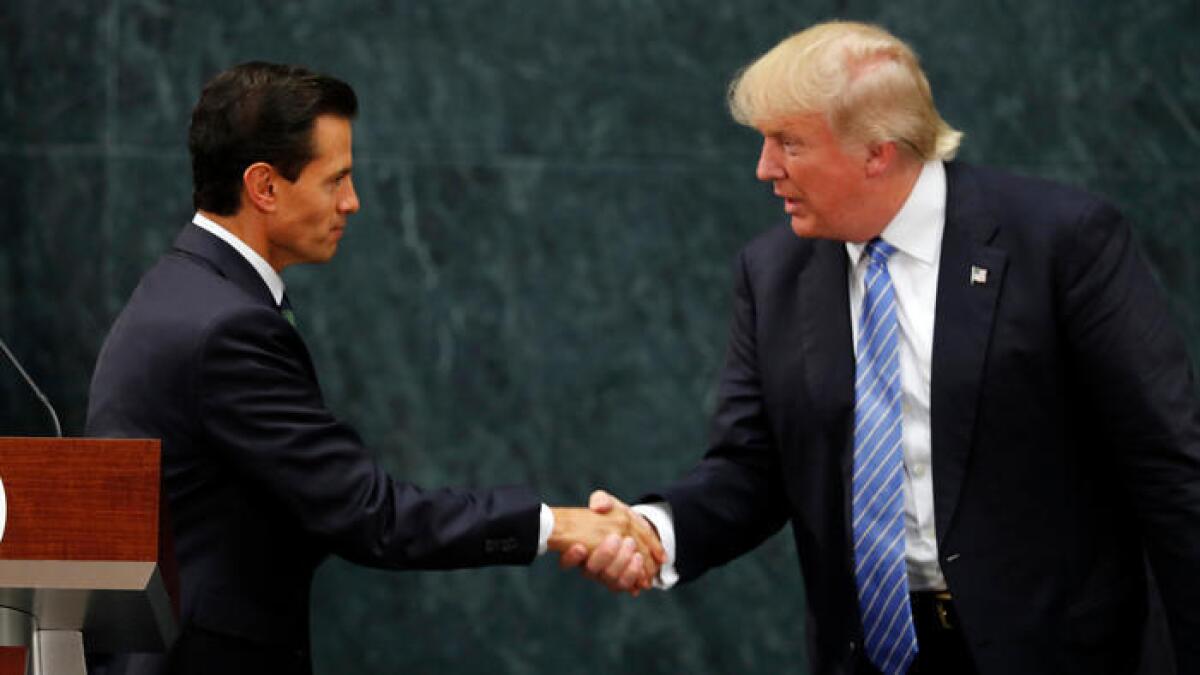
Hillary Clinton and Donald Trump sparred in Wednesday’s debate over Trump’s plan to build a wall between the U.S. and Mexico.
Trump accused Clinton of favoring “open borders” and not having a plan to stop migrants and drug smugglers from illegally crossing into the country, while at the same time assailing her of voting for building a border wall when she was a senator.
Clinton countered by pointing out that when Trump met in private with Mexico’s president in August, he didn’t bring up his plan to build a wall and make Mexico pay for it.
“He went to Mexico, he had a meeting with the Mexican president. Didn’t even raise it,” Clinton said. “He choked.”
- Share via
Trump calls Clinton ‘such a nasty woman’

After Hillary Clinton jabbed at Donald Trump for avoiding paying federal income taxes at the third presidential debate, he called her “such a nasty woman.”
People will be talking about that one.
While describing her plan to raise taxes on the wealthy to fund Social Security, Hillary Clinton took a jab at Donald Trump for allegedly trying to get out of paying taxes.
“My Social Security payroll contribution will go up, as will Donald’s — if he can’t figure out how to get out of it,” she said.
Trump interrupted to say, “Such a nasty woman.” Clinton didn’t appear to respond, but Twitter users were angered.
- Share via
Debate scorecard: Clinton hits on Trump’s weak spot — foreign policy — and wins the fifth round
Our judges agree that Trump’s foreign policy knowledge is shaky at best, and it showed in this round.
- Share via
Top dictionary searches during the final presidential debate: Big, hombre, ombre, amnesty, espionage, umbre
It’s spelled “hombre.” It means man in Spanish. And the city in Syria is Aleppo, not “a lepo.”
Donald Trump’s line on immigration — “We have some bad hombres here and we’re going to get them out” — led to a flurry of searches over at Merriam-Webster, a dictionary company. Here’s a list of the dictionary’s top search terms from the first and second halves of the debate, from Merriam-Webster lexicographer Peter Sokolowski.
- Share via
Donald Trump declines to say he’d accept the results of the election, even though voter fraud is rare

Asked if he will accept the results on election day, Donald Trump tells the country he wants to “leave you in suspense.”
Donald Trump doubled down on his allegations of a “rigged election” on Wednesday, declining in a major breach of democratic protocol to say he’d accept the results of the election.
His reasoning included an implication of widespread voter fraud, asserting there are “millions of people that are registered to vote that shouldn’t be registered to vote.”
But Trump is vastly overstating how common voter fraud is, according to election experts.
- Share via
Donald Trump has stumbled while trying to capitalize on WikiLeaks

Hillary Clinton asks Donald Trump to “make it clear he will not have help of Putin in this election.” (Oct. 19, 2016)
Hillary Clinton challenged Donald Trump in their final presidential debate to condemn Russian email hacking that she alleges is aimed at influencing the election. He declined.
Trump flatly rejected the findings of U.S. intelligence agencies that the Russian government was responsible for infiltrating Democratic Party emails, a major headache for Clinton in the campaign’s closing weeks.
“Hillary, you have no idea” whether Russia is responsible for the hacking, Trump said, adding that the U.S. also has no idea about it. “I doubt it,” he said.
- Share via
Trump said sex assault allegations had been ‘debunked,’ but that’s not really true
Donald Trump, asked in the debate on Wednesday about the multiple women who have accused him in the last week of unwanted sexual advances and inappropriate touching, dismissed such allegations as “all fiction” and said their stories had “largely been debunked.”
While the Trump campaign has offered some rebuttals to a few of the charges, the allegations — some of which center around events that occurred decades ago — have hardly been settled.
- Share via
Will Trump accept election results? ‘I’ll keep you in suspense,’ he says
Trump has said repeatedly in the last few weeks that he fears the election is rigged. Tonight he accused Clinton of being a criminal and said she should never have been allowed to run, then claimed that millions of voters were inappropriately logged on the nation’s voter rolls. (Experts widely agree that the instances of actual, proven voter fraud in the U.S. are vanishingly slim.)
Which led moderator Chris Wallace to ask whether Trump would accept the election results, noting that the nation has a tradition of peaceful transfer of power.
“I will look at it at the time,” Trump said. “I’ll keep you in suspense.”
“That’s horrifying,” Clinton said, adding later: “He’s talking down our democracy, and I, for one, am appalled.”
- Share via
Debate scorecard: Clinton wins fourth round focusing on election-rigging and scandal
As judge Doyle McManus said, “This was Trump unshackled, and it wasn’t a pretty sight.” See more of the judges’ thoughts.
- Share via
Will Trump accept election results no matter what?
- Share via
Did Donald Trump mock a New York Times reporter’s disability?
Hillary Clinton castigated Donald Trump for his lewd comments about women recently unveiled in 2005 audio.
But she went a step further during Wednesday’s debate, noting that last year Trump seemed to mock Serge Kovaleski, a New York Times reporter, who has a disability.
Clinton’s campaign has released several television advertisements in recent weeks with disabled supporters upset by Trump’s comments.
- Share via
Trump at debate on groping allegations: ‘I didn’t even apologize to my wife ... because I didn’t do anything’
Debate moderator Chris Wallace asked about the allegations many women have brought against Trump, accusing him of unwanted sexual advances.
“Why would so many different women over so many different circumstances over so many years … why would they make up these stories?” Wallace asked.
Trump said the stories had been “largely debunked” and suggested the women’s stories had been organized by the Clinton campaign, or that the women were coming forward with “lies and fiction” for their “10 minutes of fame.” (The women and news outlets that brought the allegations against Trump have stood by their stories.)
“I didn’t even apologize to my wife, who is sitting right here, because I didn’t do anything,” Trump said, referring to his wife, Melania.
Melania Trump has defended her husband since video emerged of him saying in vulgar language in 2005 that he liked to grab women by their genitalia without their consent. She said she accepted his apology for that.
“The words my husband used are unacceptable and offensive to me,” Melania Trump said in a statement after the 2005 “Access Hollywood” tape was released by the media in early October. “This does not represent the man that I know. He has the heart and mind of a leader. I hope people will accept his apology, as I have, and focus on the important issues facing our nation and the world.”
Trump concluded his defense with the statement:
“Nobody has more respect for women than I do,” which drew a reaction from the audience, leading Wallace to chide, “Please, everybody.”
- Share via
Debate scorecard: In the closest debate so far, judges declare round 3 a draw
Our judges unanimously declare the third round of the debate a draw, saying neither candidate managed to sway any voters to their side.
- Share via
Contrast between Trump and Clinton’s tax plans front and center in debate
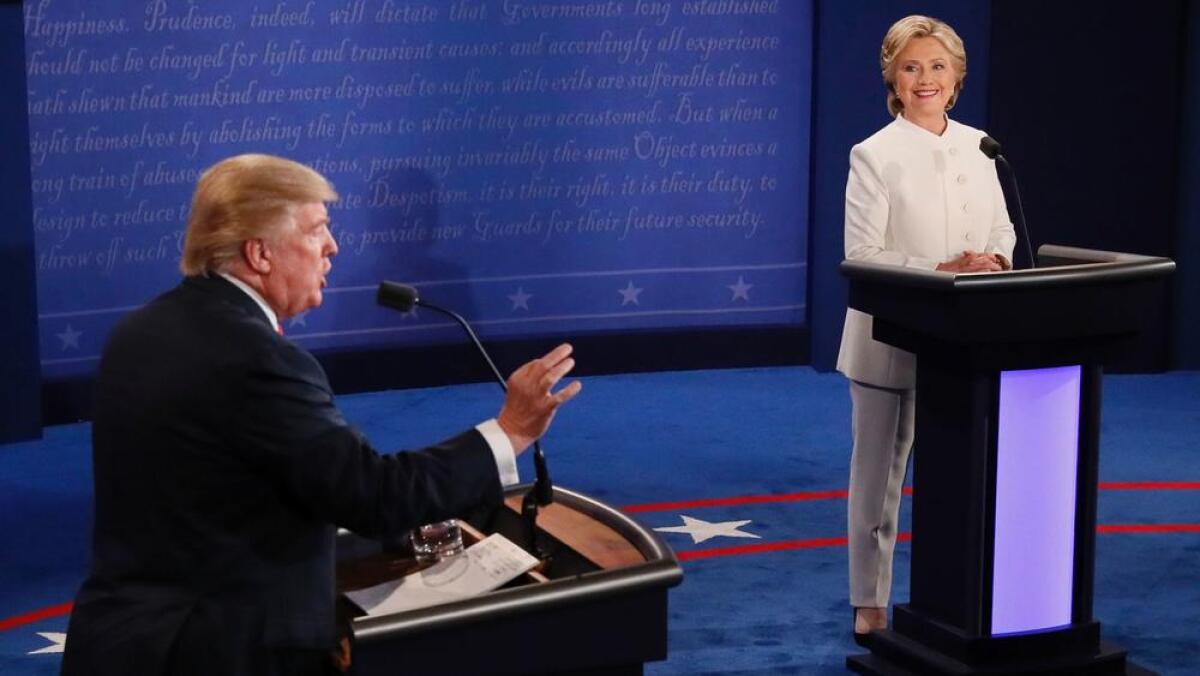
Donald Trump and Hillary Clinton have markedly different tax plans, which was on full display at Wednesday night’s debate.
Trump would dramatically cut income taxes for the wealthiest Americans, which would, overall, worsen the national debt by $7.2 trillion over the next 10 years unless offset by spending cuts that he has not proposed.
Clinton’s plan would increase federal taxes by about $1.4 trillion over the decade, almost entirely by raising the bill on the same people whose taxes Trump would slice the most -- the top 1% of income earners.
The Times’ Washington bureau chief David Lauter wrote about the two plans.
- Share via
It’s not true that Clinton’s plan wouldn’t add to the national debt, but Trump’s plan would add even more
Neither candidate has a plan to reduce the national debt, according to the nonpartisan Committee for a Responsible Federal Budget, but Donald Trump would increase it far more than Hillary Clinton.
- Share via
Debate scorecard: Our judges call a narrow second-round win for Clinton after candidates spar over Wikileaks and Russia
The two candidates were back to fighting form in the second round of the debate, arguing about open borders, immigration and Russia’s involvement in the election. Ultimately, it was Clinton who came out on top.
- Share via
Hillary Clinton’s ‘puppet’ line gets a reaction
- Share via
Putin comes up again
- Share via
Did Hillary Clinton disagree with the Supreme Court on 2nd Amendment rights for Americans?
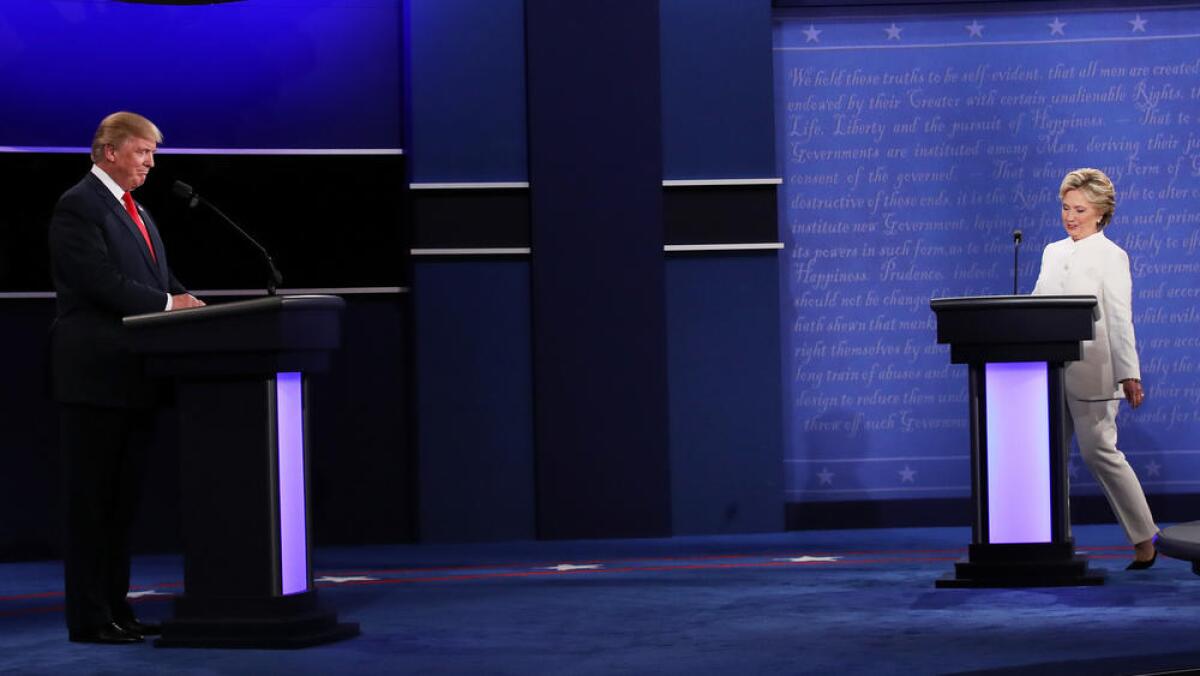
The issue of the 2nd Amendment was raised at the outset of Wednesday’s debate between Hillary Clinton and Donald Trump.
Trump assailed Clinton as a candidate who would hurt the 2nd Amendment rights of Americans. Moreover, moderator Chris Wallace noted Clinton’s past statements in opposition to a 2008 Supreme Court ruling.
“I disagree with the way the court applied the 2nd Amendment in that case,” Clinton said Wednesday, adding that she supports the 2nd Amendment but also wants to see more restrictions on firearms, such as universal background checks.
Read more about some of the differences between Clinton and Trump on the issue of guns.
- Share via
Trump on immigration: ‘We have some bad hombres here, and we’re going to get them out’

Donald Trump reaffirmed his desire to build a border wall with Mexico and said his ultimate goal is to get the “bad hombres” out of the U.S.
Trump dropped a memorable line early in the debate, during a question on immigration.
“We have some bad hombres here, and we’re going to get them out,” said Trump, adding that four of the audience members were people who had family members killed by immigrants who had entered the U.S. illegally.
Trump confirmed that he still wanted to build the border wall between the U.S. and Mexico -- the first time he’s brought up the wall during the three presidential debates.
- Share via
Watch Trump’s statement on how he will take care of ‘bad hombres’

Donald Trump reaffirmed his desire to build a border wall with Mexico and said his ultimate goal is to get the “bad hombres” out of the U.S.
We have some bad hombres here and we’re going to get them out.
— Donald Trump, defending his immigration stance
- Share via
Debate scorecard: The sedate first round is declared a draw
After a decidedly less fiery start than the previous two debates, our judges call round one a draw. Keep up with the rest of the debate scores here
- Share via
You actually don’t have to choose between going to the NLCS game and watching the debate
- Share via
The final debate begins without a handshake

Donald Trump and Hillary Clinton take the stage to begin the final presidential debate.
No handshake.
Hillary Clinton, the Democratic candidate, and Donald Trump, the Republican candidate, did not greet each other as Wednesday night’s debate began – the last of the general election’s three debates. Trump and Clinton entered on opposite sides of the stage and never ventured farther than their lecterns.
The tenor of the campaign has taken a dark turn in its final month, as Trump has faced allegations of sexual assault against several women. Trump denied the claims as part of a conspiracy to rig the election.
The pair also did not shake hands at the beginning of the second debate, though they shook hands afterward. They shook hands at the start of the first debate.
- Share via
Seated vs. standing? Where the candidates are makes for a very different debate
- Share via
Was Justice Ruth Bader Ginsburg ‘forced to apologize’ for her comments about Trump?
Moments into the final presidential debate, Donald Trump faulted Supreme Court Justice Ruth Bader Ginsburg for criticizing his candidacy.
“She was forced to apologize, and apologize she did,” Trump said.
In July, Ginsburg said that she despaired for the country if Trump were elected, and she described him as egotistical, inconsistent and a “faker.”
She faulted Trump for saying “whatever comes into his head at the moment,” but then acknowledged that she too had spoken without thinking about the consequences.
Many legal commentators said it was unprecedented for a justice of the high court to speak out against a political candidate during an election year.
Responding to harsh criticism from Trump and many others, Ginsburg issued an extraordinary apology, saying she regretted her “ill-advised” comments.
“Judges should avoid commenting on a candidate for public office. In the future I will be more circumspect,” she said in a statement issued by the court.

Donald Trump reaffirmed his desire to build a border wall with Mexico and said his ultimate goal is to get the “bad hombres” out of the U.S.
- Share via
Watch the debate with The Times’ round-by-round scoring
- Share via
Watch the NLCS Game 4 or the presidential debate? Everyone must choose, unless you keep the sound off
The NLCS Game 4 between the Dodgers and the Cubs is already in the second inning. This Los Angeles establishment is making watching both possible, though you’ll have to watch the debate with the sound off. If you want live updates on the debate, you’re already here. If you want them on the game, go here.
- Share via
We’re scoring the third presidential debate. See who’s winning each round
- Share via
Watch it again: Clinton and Trump’s final presidential debate

Hillary Clinton and Donald Trump sparred about abortion, the economy, fitness for the presidency and foreign policy during the final presidential debate. Full coverage.
- Share via
Five things you may not know about debate moderator Chris Wallace
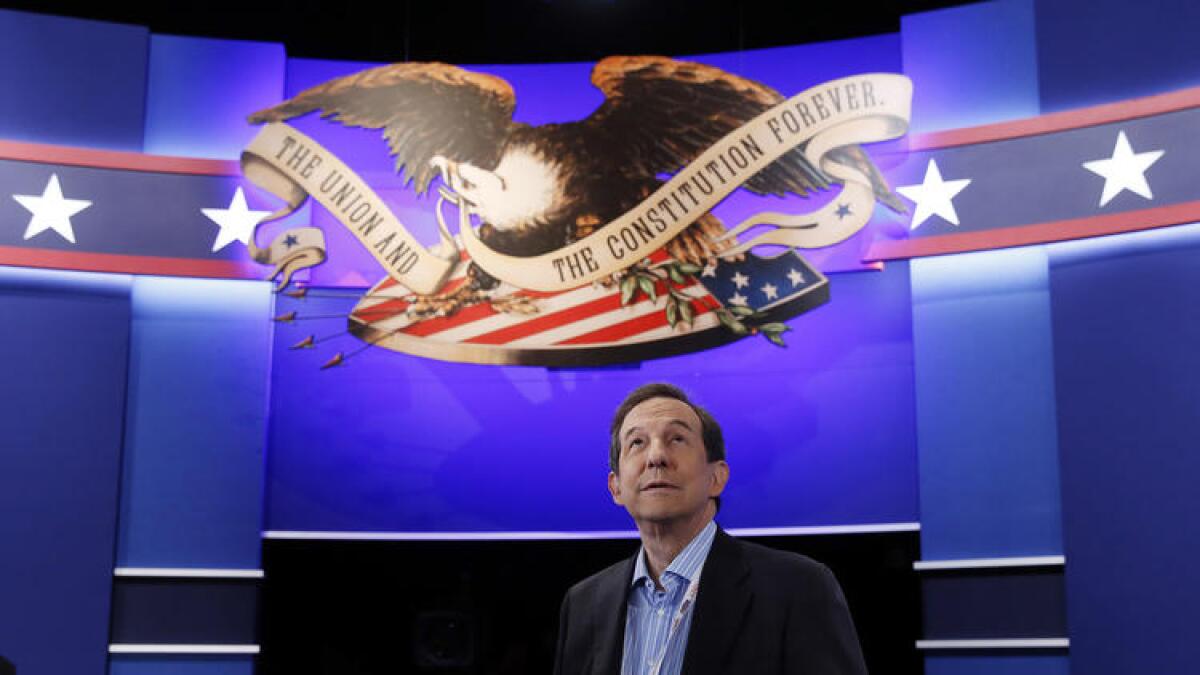
Chris Wallace will become the first anchor from Fox News to moderate a presidential debate when Hillary Clinton and Donald Trump clash for the final time Wednesday at the University of Nevada-Las Vegas. He may be new to viewers who don’t watch his program, “Fox News Sunday,” but the son of legendary “60 Minutes” correspondent Mike Wallace has been a TV news fixture for five decades.
Here’s five things you might not know about him:
- Share via
Gary Johnson on not debating Hillary Clinton and Donald Trump: ‘Really it just sucks’
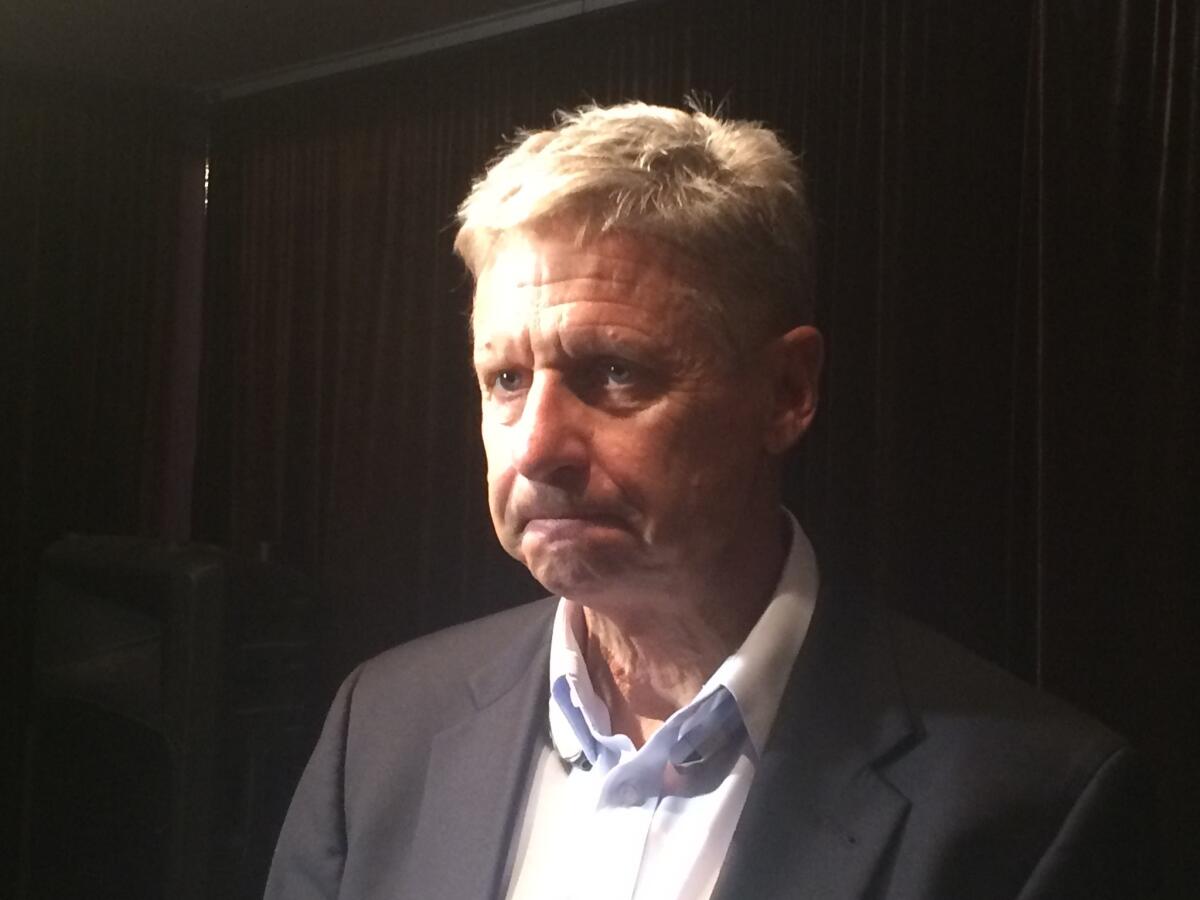
It rankles Gary Johnson he won’t be onstage Wednesday night with Hillary Clinton and Donald Trump for the final presidential debate.
“Really, really it just sucks -- no other way to put it,” the Libertarian presidential nominee said prior to an event inside a chic Los Angeles nightclub were he was set to rally supporters. “I’m the only third-party candidate on the ballot in all 50 states.”
Johnson, a former New Mexico governor, has been absent from the stage in all three presidential debates because he’s unable to meet the national polling threshold of 15% in five major national polls. Johnson said if he were allowed to participate, he could, perhaps, force Clinton and Trump to focus solely on issues.
“Maybe we could actually talk about issues, instead of seeing them talk about how they’re going to kill one another,” Johnson said.
In recent months, Johnson, who in some polls has done well with millennial voters, has sought to shore up that support by reaching out to young people who backed Bernie Sanders throughout the Democratic primary.
This week Johnson released a campaign video attacking Clinton and highlighting issues on which he says he and Sanders share common ground – among them, opposition to the Iraq war and marijuana legalization.
Sanders has endorsed Clinton and is one of her leading surrogates on the campaign trail.
- Share via
Trump faces his last, best chance to recover in third and final debate
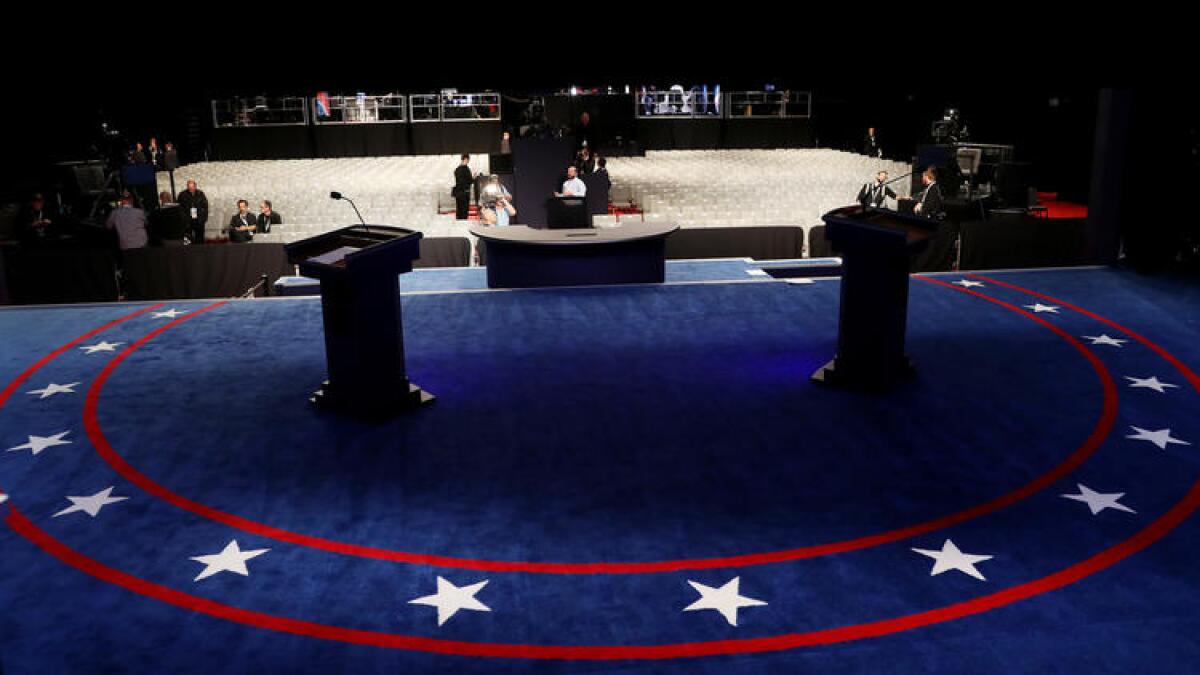
Trailing in polls and abandoned by many in his party, Donald Trump faced his last, best chance to stop his slide and keep the White House in reach as he prepared to confront Hillary Clinton on Wednesday night in their third and final presidential debate.
The designated topics were conventional enough; they included immigration, foreign policy and the economy.
But Trump has shown a penchant — on the debate stage and, especially, at his boisterous rallies — for straying far afield from policy and typical campaign discourse. He has accused Clinton, for instance, of being on drugs during their last debate and suggested fellowRepublicans were rigging the election against him.
With an expected audience in the tens of millions, the 90-minute session at the University of Nevada-Las Vegas afforded Trump the opportunity to amplify his attacks — or show a more disciplined side aimed at reassuring the large number of voters concerned about his steadiness and temperament.
- Share via
Review: Michael Moore’s ‘TrumpLand’ isn’t the firebrand you might expect
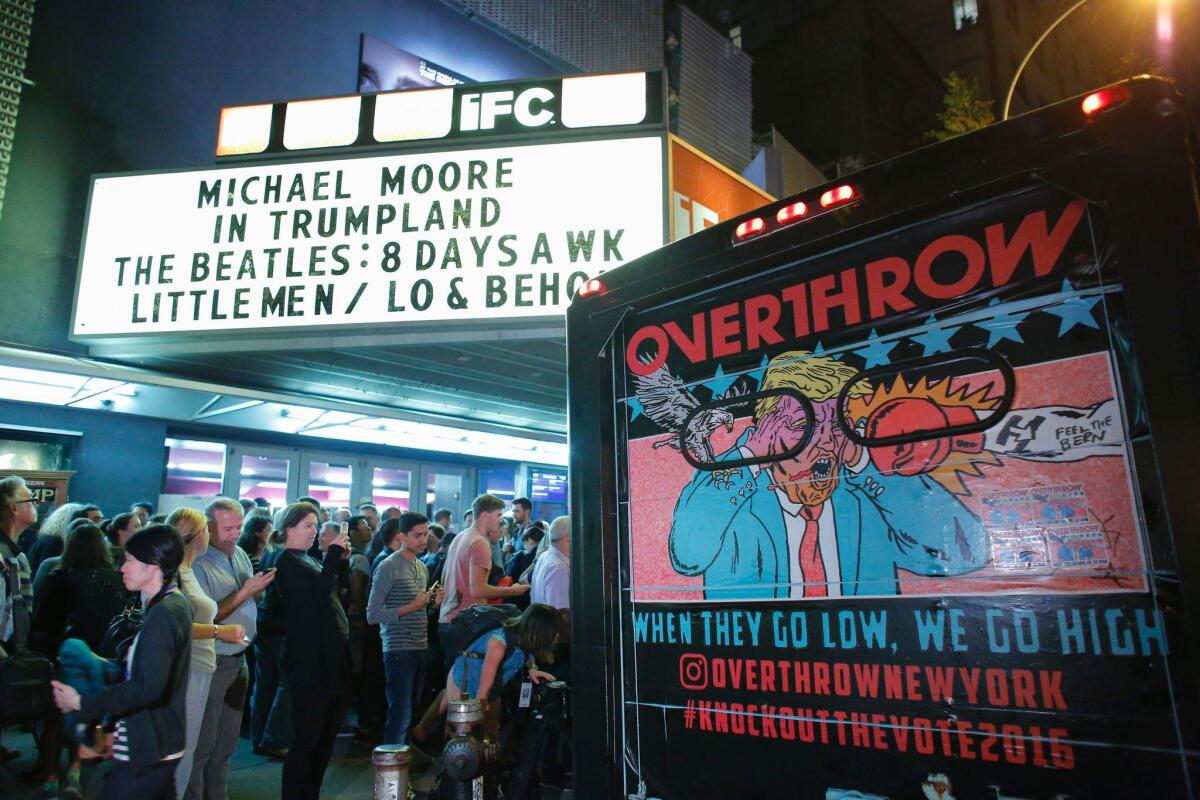
”Michael Moore in TrumpLand” is not only the title of the new film by the cinematic provocateur but it is also an accurate description of what it provides.
Not an investigative documentary on the order of the writer-director’s previous films like “Fahrenheit 9/11,” “Bowling for Columbine” or “Sicko,” “TrumpLand” is rather a rambling, mildly entertaining performance film recording a stand-up appearance Moore recently made in the heart of Trump country.
- Share via
Waiting for the debate to start? Play the race to 270 votes
- Share via
If you’re in L.A., you still have an hour to watch the debate with us in person
Assistant managing editor for politics Christina Bellantoni, Sacramento bureau chief John Myers and politics reporter Seema Mehta will be on stage after the debate to talk about it. This is how you can still go.
- Share via
Here is who Trump and Clinton invited to the final presidential debate
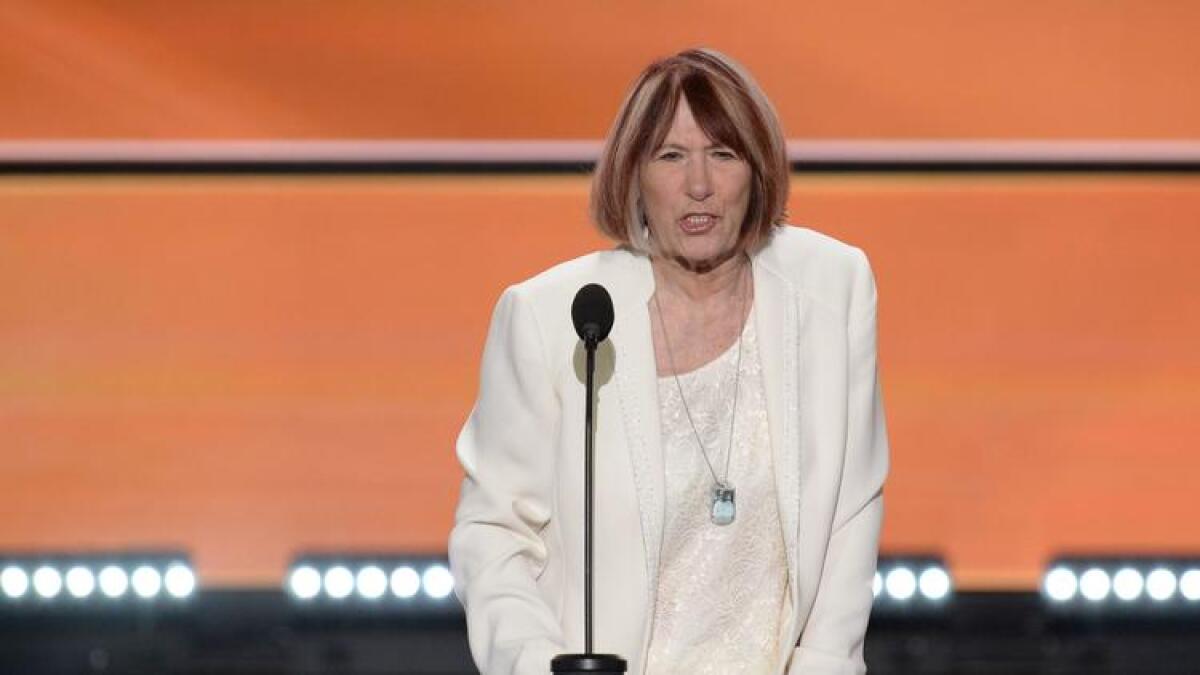
Usually, the special guests whom presidential nominees invite to their debates are meant to underscore some central theme of the candidate’s agenda or uplifting moment in their biography.
This year, the guests in the spotlight underscore how much the candidates dislike one another. Both Hillary Clinton and Donald Trump will be bringing people whose purpose for coming appears to be antagonizing their opponent.
Here’s who will be in the guest seats in Las Vegas on Wednesday night:
- Share via
More than 2.3 million voters cast ballots before the final presidential debate
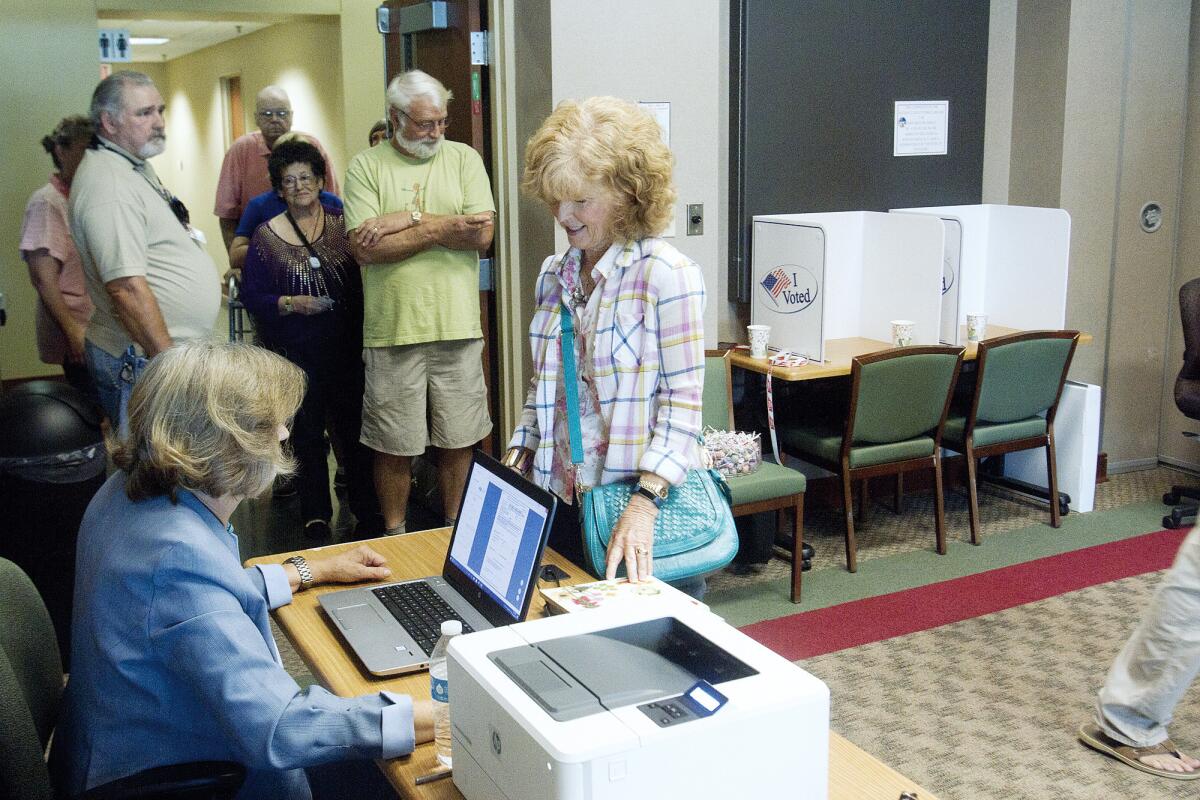
Nevada is not only playing host to the final presidential debate Wednesday; the day marks the first when voters in the Silver State can cast ballots by mail.
Though election day is still 20 days away, voters have mailed in ballots in nearly half of the 50 states — more than 2.3 million in total, according to data from the Associated Press and the United States Elections Project.
That includes more than three-quarters of a million votes in Florida, where state Democrats are touting the fact that they have nearly erased a traditional GOP advantage in votes by mail. About 10,000 more Republicans than Democrats have voted by mail, according to the Florida secretary of state, a shrinking lead compared with past elections.
Nearly 240,000 votes have been cast in Georgia, 216,000 in Iowa, 169,000 in Michigan and 129,000 in Virginia.
Hillary Clinton’s campaign manager, Robby Mook, said again this week that the volume of early voting indicated the country was on track for a record turnout — which he believes would point to a Clinton win.
“Voter registration data and early vote data has shown us often exceeding trends on the 2012 campaign,” he said.
Voting by mail also began this week in Colorado. Starting on Thursday, North Carolina voters can vote in person at county boards of elections sites.
Though more than 2 million Americans have already voted, that represents just 5% of the total number of early votes cast in the 2012 election, according to U.S. Elections Project director Michael McDonald.
Those early voters aren’t necessarily tuning out the debate, he noted:
- Share via
Here’s why Nevada is hosting the final presidential debate
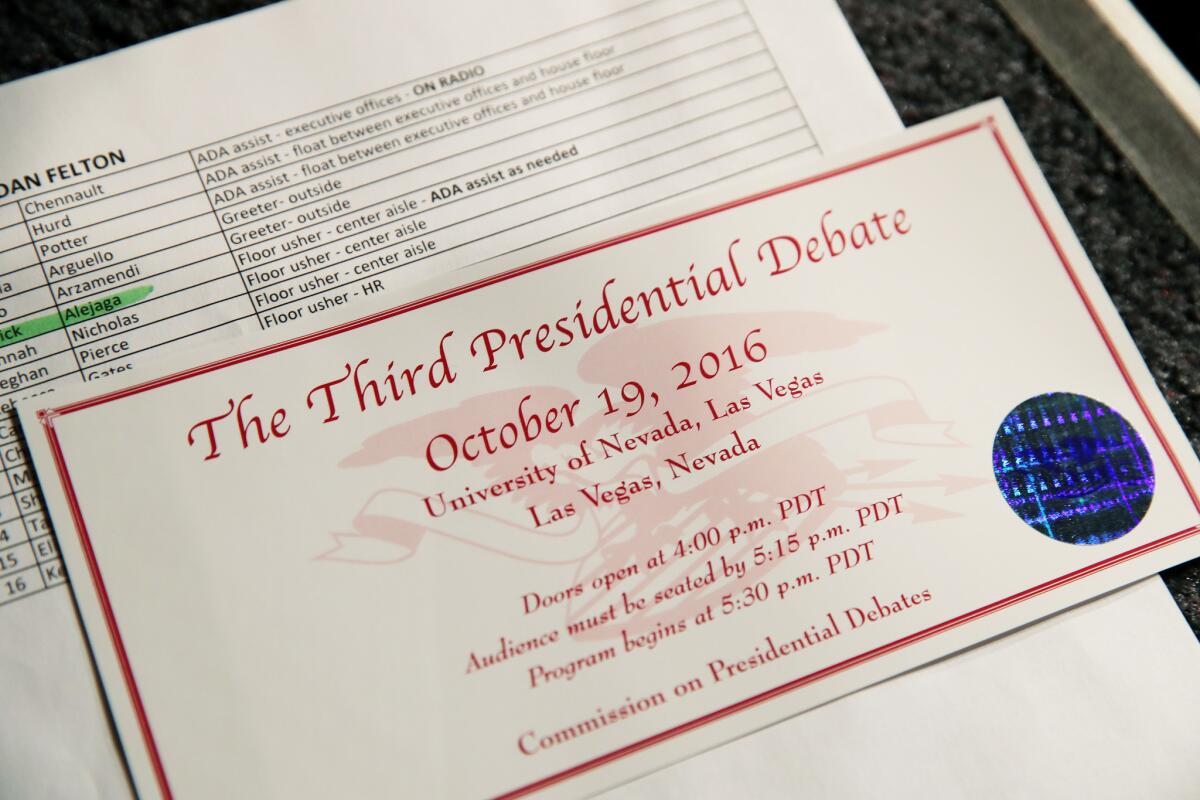
You’d be hard-pressed to find a swing state more swinging than Nevada. Over the past century, the candidate who won the state has been elected president in all but one election: 1976, when Gerald Ford won its three electoral votes but lost the election to Jimmy Carter.
Six electoral votes are at stake there now. For much of the year, neither Donald Trump nor Hillary Clinton seemed to have a clear advantage, making it a fitting venue for the final presidential debate.
The most recent polling, though, has shown Hillary Clinton opening up something of a lead. The latest survey, from Monmouth University, gave her a seven-point advantage.
But despite its fast-growing and increasingly diverse population (28.1% of residents are Latino, according to census data), and the strong presence of major labor unions, Donald Trump has remained competitive and even led in some surveys as recently as the start of October.
Trump’s anti-establishment pitch has shown great appeal in the state, among the hardest-hit by the housing market collapse of 2007-2008. He won Nevada’s February caucuses with nearly 46% of the vote in a crowded field.
Nevada not only is a presidential battleground but home to one of the most critical Senate races in the country, and two competitive congressional races. Republican Rep. Joe Heck and former Democratic state Atty. Gen. Catherine Cortez-Masto are in a tight race to succeed Harry Reid, the Senate minority leader, who is retiring.
Nevada’s governor, Brian Sandoval, is a Latino Republican, a moderate who has at times had to confront opposition within his own party. Reid even floated him as a potential Supreme Court pick for President Obama, to fill the vacancy caused by the death of Justice Antonin Scalia.
This month Sandoval said he could not support Trump in the election after the release of video revealing Trump’s vulgar remarks about groping women without their consent.
- Share via
Donald Trump, Bill Clinton and the sexual misconduct allegations against them
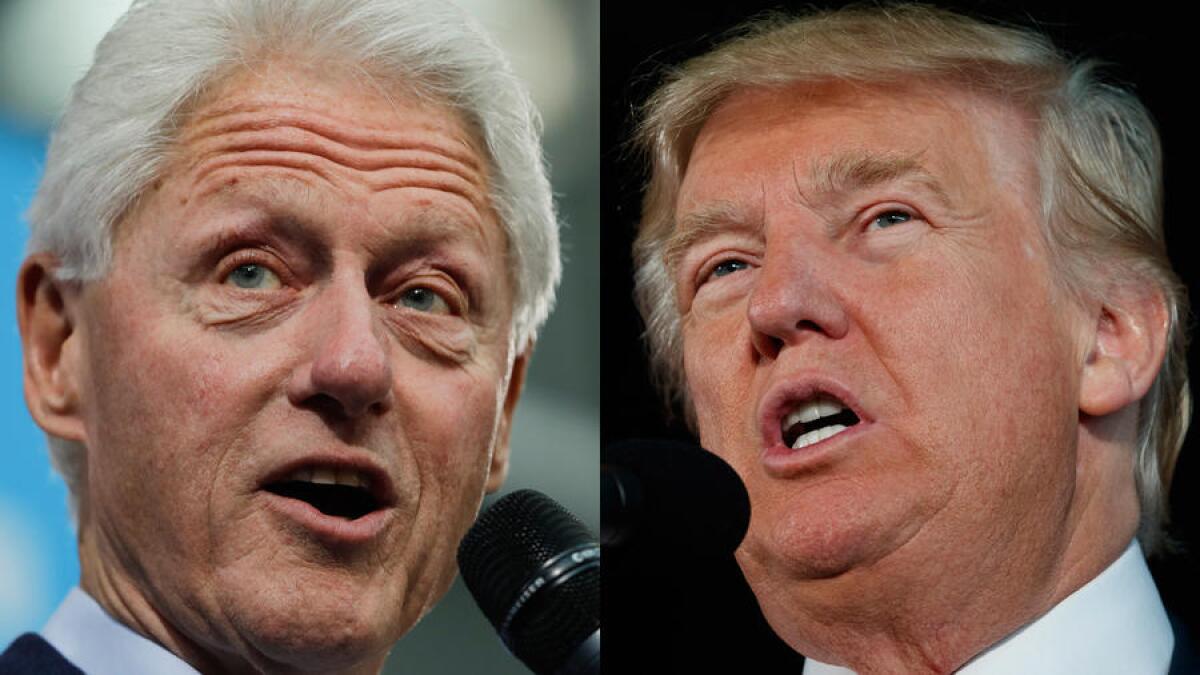
When Donald Trump apologized for saying in 2005 that he could grope women because of his celebrity, he immediately pointed to Bill Clinton as having done worse. Trump appeared before a debate alongside Clinton’s accusers and again mentioned the former president’s past while onstage with Hillary Clinton. But Trump’s argument was undercut when more women publicly came forward with allegations that he had groped or kissed them without consent.
Take a look at the pasts of both Trump and Bill Clinton and accusations against them.
- Share via
How an expert tweaked the USC/ L.A. Times poll and put Clinton ahead of Trump
Donald Trump’s consistent lead in the USC/L.A. Times “Daybreak” poll of the election — and the gap between the poll and all other major surveys — has drawn a lot of attention.
Most of the comments have come from partisans, either Trump supporters praising the poll for telling them what they’d like to believe or Clinton supporters attacking it for the opposite reason.
Ernie Tedeschi, an economist and former Treasury Department official who is adept at data analysis, looked at the issue differently. He wondered what was driving the difference between the Daybreak poll and other surveys.
He found that if he took the poll’s data and weighted it differently, what had been a tie between Trump and Clinton suddenly became a Clinton lead. Indeed, his version has the poll showing her in the lead almost the entire summer and fall.
Moreover, the reweighted version almost precisely matches the path of the Real Clear Politics average of all polls.
So who is right?
As Tedeschi noted, that’s something we can’t know until the election is over. The Daybreak poll could be “picking up a signal no one else is,” he wrote.
But his work provides reassurance that although the poll differs from other surveys, its data about the trends in the election — the ups and downs in support for the two candidates — are consistent with what others have found.
That also suggests that the poll’s underlying sample — the panel of 3,200 people who are queried each week about the election — is sound.
What Tedeschi did demonstrates how much difference the fairly technical topic of weighting a poll can make.
Weighting is something that pollsters routinely do in order to make sure that their samples properly match the U.S. population, as we explained in our Frequently Asked Questions about the poll.
There’s no single, universally agreed upon way to weight a sample. The process involves numerous decisions, all of which pose tradeoffs: Weight too little, and the poll can fail to represent the diversity of the U.S. population. Weight too much, and the poll can be distorted.
The details on how the poll is weighted are available from USC. Tedeschi also described how he did his reweighting of the data.
The main difference between the original weighing and what Tedeschi did is that he dropped some weights the USC pollsters used, most notably their decision to weight the sample to match people’s reports of whether they voted in 2012 and, if so, for whom.
It’s also worth noting that Tedeschi’s work underscores the importance of USC’s decision to make all the data from the poll available to the public — something that, unfortunately, not all pollsters do.
- Share via
Judge won’t extend Georgia voter registration again after Hurricane Matthew
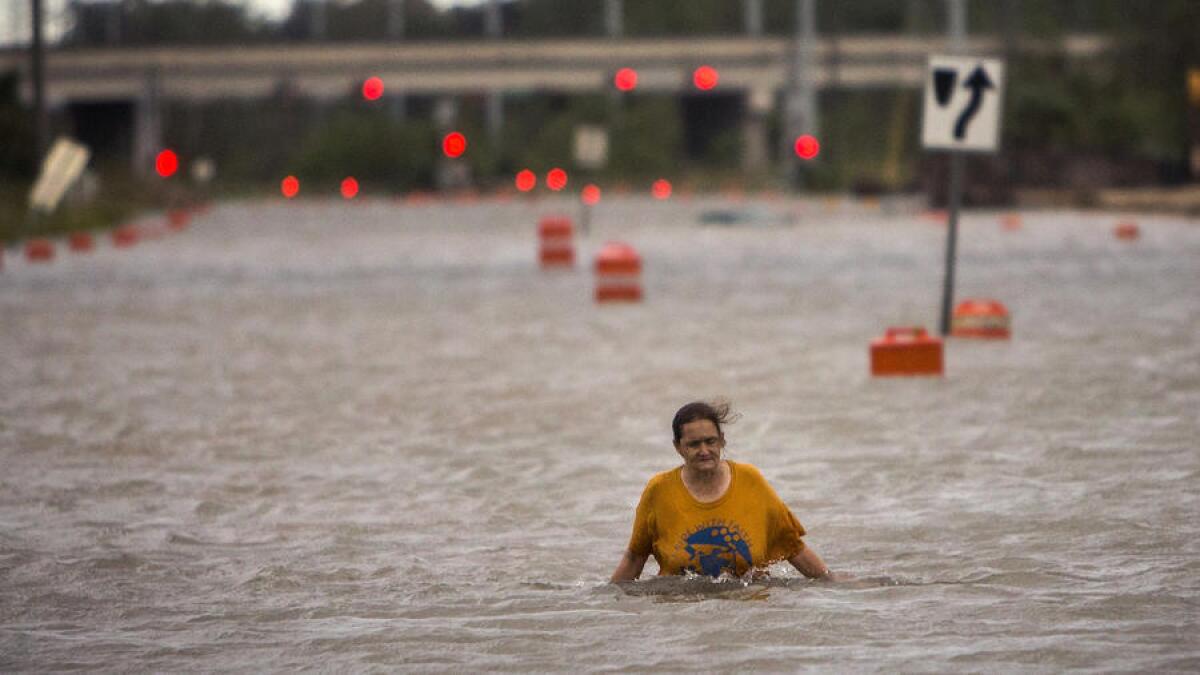
A federal judge has denied a request for a second extension of the voter registration deadline for Georgia counties stricken by Hurricane Matthew.
U.S. District Court Judge William T. Moore Jr. issued his order Wednesday after the American Civil Liberties Union filed suit seeking six additional days for new voters to sign up in Georgia’s six coastal counties. The judge said the request for another deadline extension after early voting has begun “exponentially increases the disruption to Georgia’s electoral process.”
Last week, the same judge granted a similar request by a different legal group to push back the Oct. 11 registration deadline for only Chatham County, which includes Savannah. That extension lapsed Tuesday, giving new voters just a few extra days to join the rolls.
- Share via
How to watch the third presidential debate

Hillary Clinton and Donald Trump sparred about abortion, the economy, fitness for the presidency and foreign policy during the final presidential debate. Full coverage.
Debate highlights:
- Trump calls Clinton ‘such a nasty woman’
- Candidates clash over border security
- Trump won’t commit to accepting election results
- Our judges believe Clinton won
- The Times annotated a transcript of key exchanges from the debate
What: The third and final presidential debate of the 2016 election, featuring Republican Donald Trump and Democrat Hillary Clinton, moderated by Chris Wallace of Fox News.
There will be six 15-minute segments on these topics, in order: debt and entitlements; immigration; economy; Supreme Court; foreign hot spots; fitness to be president.
When: 9 p.m. Eastern, 6 p.m. Pacific. Ninety minutes without commercial breaks
Where: Las Vegas.
TV: All broadcast channels and cable news networks: ABC, NBC, Fox, CBS, MSNBC, Fox News, Fox Business, CNN, Univision, Telemundo and C-SPAN
Livestream: Watch our livestream above.
Online: Follow The Times’ live coverage here on Trail Guide
Radio: NPR
Social media: Use the hashtags #debates or #debates2016
- Share via
Ivanka Trump says her father will accept outcome of the election
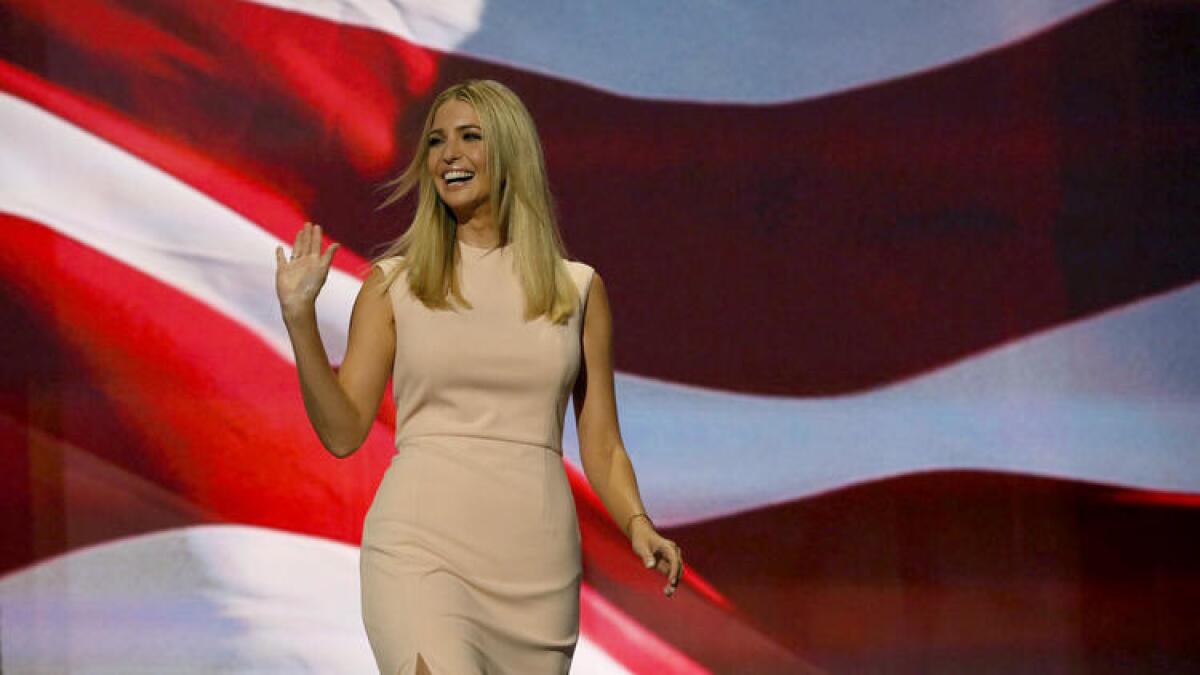
Ivanka Trump said Wednesday that she believes her father, GOP presidential nominee Donald Trump, will accept the results of the election.
“He’ll either win or he won’t win, and I believe he’ll accept the outcome either way,” Trump said at a women’s summit in Laguna Niguel.
She made the remarks as her father has increasingly been saying the election is rigged as he has slipped in the polls, leading to fears among politicians of both parties that he was trying to delegitimize the election before it happens.
Trump was asked if she believed the election was rigged, but did not repeat her father’s claims. Instead she pivoted to the media.
“I will tell you that the media has been vicious,” Trump said, adding that as a business person, she was used to occasional unfair coverage. “This has been a different level.”
Trump also spoke out about the 2005 recording that emerged earlier this month featuring her father using vulgar terms to describe women and saying he could kiss and grope them without their consent because of his fame.
She said she had not heard her father talk like that, and said that he was embarrassed and was sincere in his apology.
“That’s not language consistent with any conversation I’ve ever had with him, certainly, or any conversation I’ve overheard. So it was a bit jarring for me to hear,” she said.
- Share via
How well does Obama know his half brother who is attending the debate as Trump’s guest?
- Share via
Welcome to Las Vegas: You’re not in Farmville anymore
Presidential campaigns, which rumble around the country like traveling theater productions, provide a valuable and often fun reminder of the country’s geographic diversity.
It would be hard to find a more vivid example of the contrast than the one between Farmville, Va., the tiny but historic town that hosted the vice presidential debate on Oct. 4, and Las Vegas, the glitzy spectacle of excess that will host Wednesday’s third and final presidential faceoff.
Farmville has an understated antique mall on Main Street, a few furniture stores, charming old brick warehouses and a handful of restaurants that serve the town’s two universities.
Farmville’s rich but complicated history dates from the Civil War to the Civil Rights era.
Small pleasures, like the refurbishing of a vintage Coca-Cola sign before the big debate, still generate buzz. But even with a swarm of reporters in town for the debate, it was quiet.
Then there’s Las Vegas, where hotels just a few years old are dismissed as passe relics, ready for implosion.
The reporters wandering among them are hardly noticed among the crowds of conventioneers, partiers and exotic entertainers.
Even a fast-food breakfast can be eaten on a round couch, encased in a room-sized chandelier, and cost no less than $15.
The bookcases in the lobby of the Cosmopolitan, where Trump’s traveling press is housed, are -- like almost everything else here -- a digitally produced mirage.
- Share via
Nancy Pelosi: Trump’s voter fraud claims ‘irresponsible’
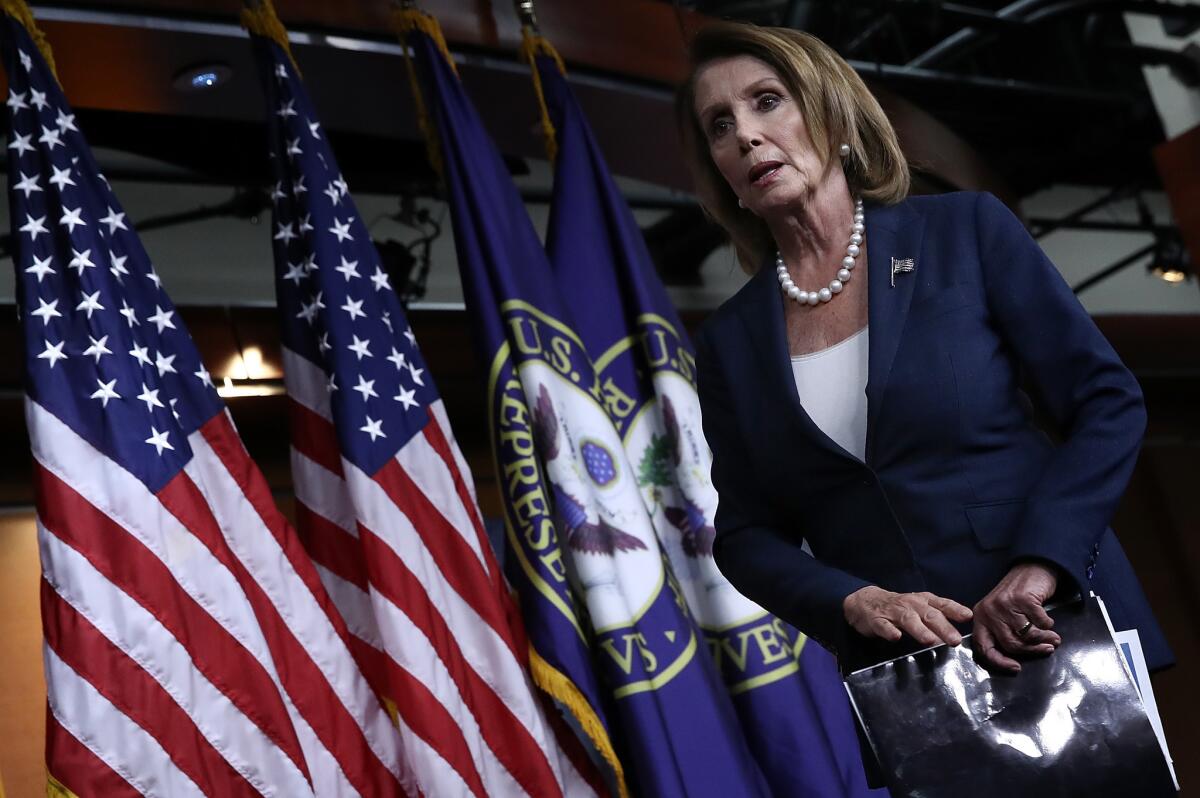
House Minority Leader Nancy Pelosi (D-San Francisco) said Donald Trump’s unsubstantiated charges of voter fraud are “irresponsible” and called on Republican congressional leaders to join her in condemning them.
Peolosi told a Capitol Hill news conference that she hopes Senate Majority Leader Mitch McConnell (R-Ky.) and House Speaker Paul D. Ryan (R-Wis.) “will join us in saying that we have confidence in our system and that we always respect the results of the election.”
Congressional Democrats have sought to tie Republicans lawmakers to the GOP nominee all year with mixed success.
McConnell and Ryan have largely avoided mentioning Trump this month as his campaign has struggled with falling poll numbers and the fallout of a 2005 recording in which he boasted about groping women, which he later dismissed as “locker room banter.”.
A spokeswoman for Ryan did respond to Trump’s charges of voter fraud over the weekend, however.
“Our democracy relies on confidence in election results and the speaker is fully confident the states will carry out this election with integrity,” AshLee Strong said.
On Tuesday, President Obama condemned Trump’s charges of voter fraud as without foundation, and urged him to “stop whining” before the election is held.
Congress is in recess but Pelosi was in Washington to attend Tuesday night’s White House state dinner honoring Italian Prime Minister Matteo Renzi.
She predicted, as polls suggest, that Hillary Clinton would beat Trump on Nov. 8. She was more circumspect about the prospects of a Democratic takeover of the GOP-led House, saying only that results may be close.
- Share via
Crowded tarmac in Las Vegas as candidates arrive for final debate
- Share via
Rigged election? No, Elizabeth Warren says, Trump is trailing in polls due to his ‘creepy bullying’
Massachusetts Sen. Elizabeth Warren, one of Democrats’ favorite Donald Trump antagonists, launched a new hit on the Republican nominee on Twitter over his renewed warnings about election fraud and a “rigged” election.
If there’s anything to blame for his deficit in the polls, it’s his “creepy bullying,” the lawmaker asserted.
Warren also challenged the Republican Party more broadly, saying Trump’s rhetoric was just an extension of past GOP talking points. It’s the subject of a longer op-ed she penned for the Washington Post.
- Share via
Marco Rubio’s warning to Republicans over WikiLeaks: ‘Tomorrow it could be us’
Donald Trump’s campaign sees new disclosures about the inner workings of Hillary Clinton’s campaign by WikiLeaks as a political gold mine. But Sen. Marco Rubio is warning fellow Republicans not to celebrate the trove of hacked emails from a top campaign official.
“As our intelligence agencies have said, these leaks are an effort by a foreign government to interfere with our electoral process and I will not indulge it,” Rubio said in a statement to ABC News. “Further, I want to warn my fellow Republicans who may want to capitalize politically on these leaks: Today it is the Democrats. Tomorrow it could be us.”
The Clinton campaign has declined to verify that the contents of the emails are accurate, and warned that the contents could be manipulated for political reasons.
It notes that U.S. intelligence officials have determined the hack to be the work of Russian intelligence as part of an attempt to influence the U.S. election.
- Share via
Surprise! Michael Moore releases ‘TrumpLand’
This election is going to be decided by whether people will stay home. I hope I can light a fire and get it out in the next weeks to millions of people.
— Michael Moore
Michael Moore had mostly stayed quiet during this election season. Until now.
The documentary provocateur surprised just about everyone this week by releasing a one-man show he filmed at a theater in the true-red town of Wilmington, Ohio.
He said his purpose is to rally what he termed the “depressed Hillary voter.”
Moore said Tuesday he had actually been writing the theater piece for much of the last year. (It was not clear when he made the decision to record the show and release it as a movie.)
The film, titled “TrumpLand,” premiered Tuesday night at New York’s IFC Center. It opens Wednesday there, as well as at the Laemmle 5 in Encino and on several digital platforms.
- Share via
DNC apologizes for latest Clinton campaign ‘leak’ — sewage
A Clinton campaign bus dumped raw sewage into a Georgia street drain in what the Democratic National Committee called an “honest mistake” Tuesday.
The manager of a store in Lawrenceville, Ga., along Grayson Highway watched through the window around 9:30 a.m. Tuesday as the bus stopped and opened the tank over a storm drain, according to reports from local TV station Fox 5 Atlanta.
The DNC hired the bus for Hillary Clinton’s campaign trail and said in a release that the driver of the charter bus worried the overflowing tank would turn into a leak hazard for other drivers on the road.
“This was an honest mistake and we apologize to the Lawrenceville community for any harm we may have caused,” the DNC said in a statement. “We were unaware of any possible violations and have already taken corrective action with the charter bus company to prevent this from happening again.”
Toilet paper and foul smells remained after the bus left, according to the police report. A hazmat crew was sent to the area, while police continue to investigate the charter bus company to determine the cause of the violation.
- Share via
One Obama half brother is attending tonight’s debate to support Trump, but another disapproves
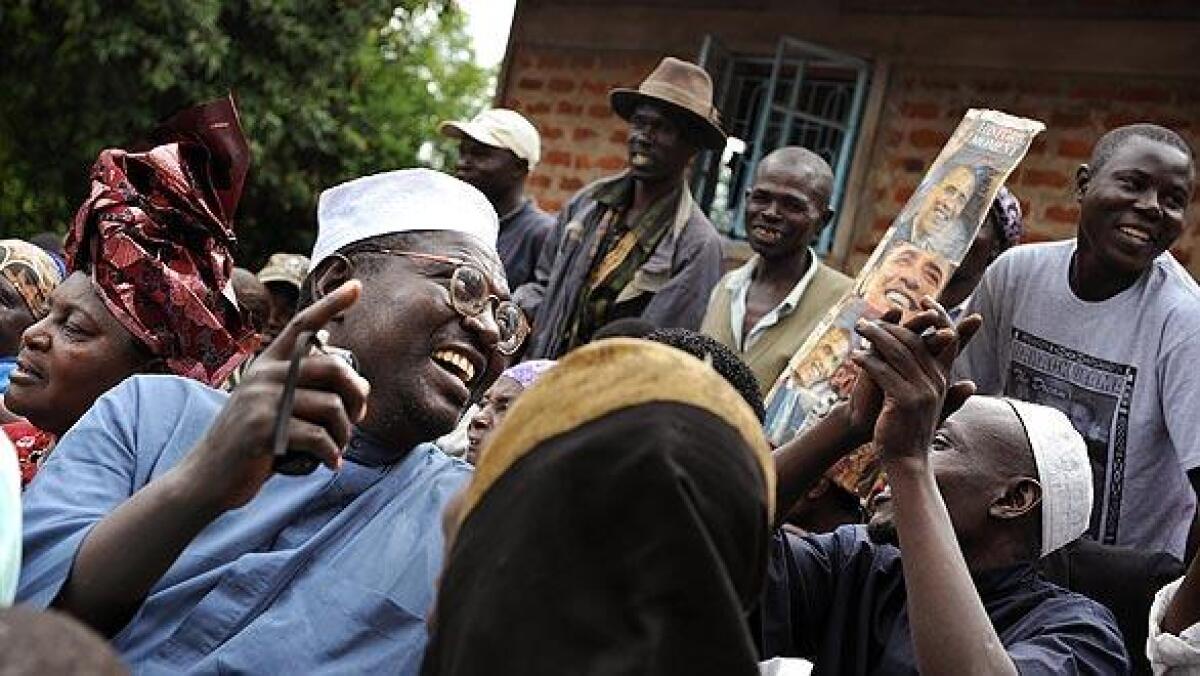
President Obama’s two half brothers don’t agree when it comes to Donald Trump.
Malik Obama, who is estranged from Obama, supports the Republican candidate and received an invite as Trump’s guest to the third and final presidential debate Wednesday.
But Mark Obama Ndesandjo, who lives in the south of China, disagrees.
“I love my brothers, but no one member represents the Obamas,” Ndesandjo told the Associated Press in an email Wednesday.
All three half brothers share the same father, but have different mothers.
Malik Obama will attend the debate on invitation from the Trump campaign at the University of Nevada, Las Vegas.
He will join Pat Smith, the mother of an American who died in the Benghazi attack and an outspoken critic of Democratic nominee Hillary Clinton.
- Share via
Italian premier has high praise for first lady’s campaign speeches: ‘Better than your tomatoes’
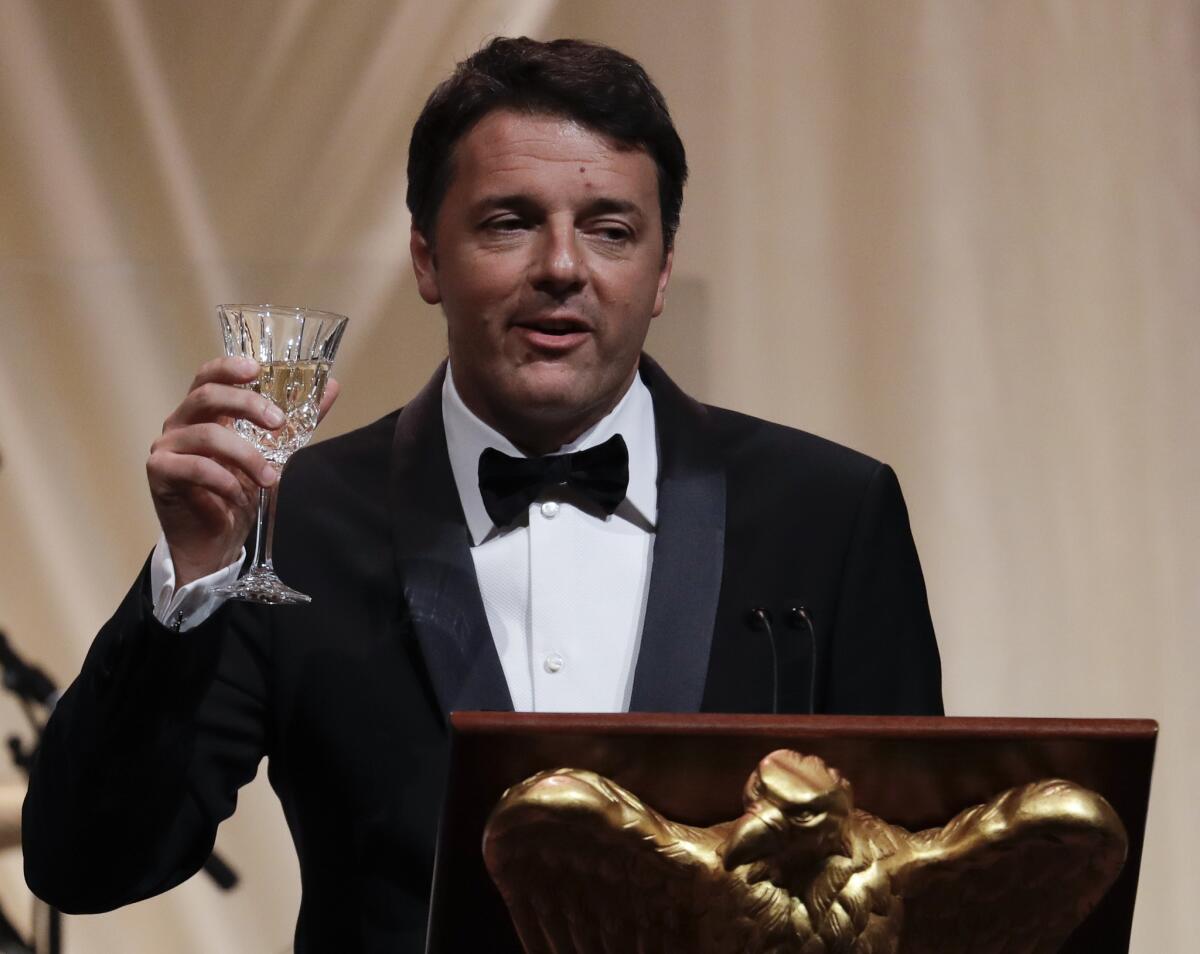
Italian Prime Minister Matteo Renzi was one of President Obama’s biggest fans before he was his peer on the world stage. And as he toasted the president during a state dinner in his honor at the White House Tuesday, he teased that Obama had real competition as a political force from his own wife.
“When I listened to the speech of Michelle in Philadelphia, I think finally, finally ... I found someone of the same level of Barack Obama,” he said, even citing the signature line of that convention speech from Michelle Obama: “When you go low, we go high.”
Renzi noted that the first lady has taken great pride in her White House kitchen garden.
“Michelle, your tomatoes are great. But after the last weeks, let me be very frank -- your speeches are better than your tomatoes,” he said. “Thank you so much as prime minister, but thank you so much as father of a young daughter.”
In his toast of Renzi, President Obama noted that the work of great Italians was clear throughout American life -- mostly for good.
“Some days our presidential campaigns can seem like something out of Dante’s Inferno,” he added.
- Share via
Meet the janitors who gave up their weekend to campaign for Hillary Clinton in Nevada
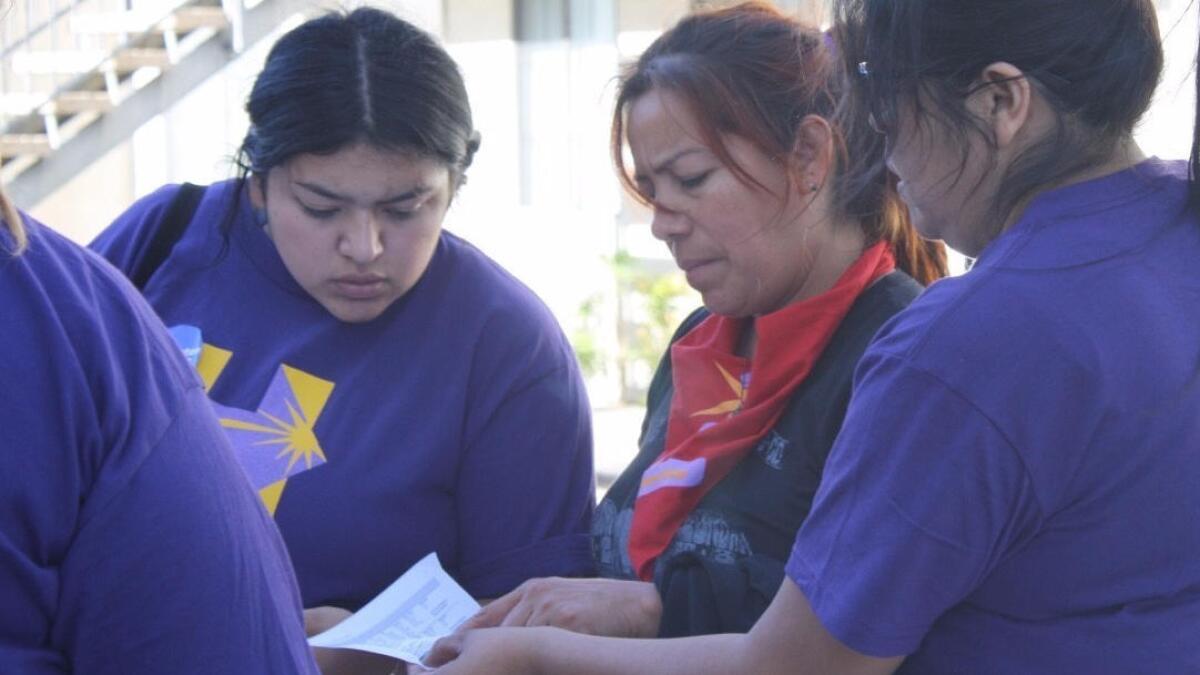
Twenty-one-year-old Yamilex Rustrian cannot vote, but she would like to one day. So the Dreamer is doing all she can to make sure Hillary Clinton becomes president.
Last weekend, doing all she can meant climbing into a van with her mother, a janitor who is in this country without authorization, and a dozen other Service Employees International Union members and their children at 3 a.m. for a quick trip to knock on doors in Las Vegas.
Rustrian was 7 when she and her younger sister came to live in the U.S. with their mother, who was already living here illegally. Her mother paid a smuggler to collect her daughters after their father was shot and killed by gang members in Guatemala shortly before Father’s Day. She thought they’d be safer here.
- Share via
On debate day, Clinton hits unifying note in new TV ad
Before Americans watch the third and final presidential debate between Hillary Clinton and Donald Trump, Clinton’s campaign will remind them of a scene from the second.
A new 60-second advertisement airing in battleground states includes some of the Democratic nominee’s comments about unifying the country, which she delivered at the face-off in St. Louis.
“I want to send a message … to every boy and girl and, indeed, to the entire world, that America already is great, but we are great because we are good,” she is heard saying over a montage of a diverse group of Americans with a soft piano soundtrack.
“My vision of America is an America where everyone has a place,” she adds, an implicit contrast to the divisive rhetoric of Trump.
The ad will air in Florida, Iowa, Nevada, New Hampshire, North Carolina, Ohio and Pennsylvania.
Clinton arrived in Nevada on Tuesday night in advance of this evening’s final encounter.
- Share via
To win the debate, Donald Trump needs to turn the attention to Hillary Clinton
Throughout the long and tawdry presidential campaign, both Donald Trump, by dint of his personality, and Democrats, by dint of the damage they see him doing to his cause, have kept the attention focused on him.
On Wednesday, from a stage at the University of Nevada Las Vegas, Trump will face an imperative that sounds simple but has eluded him for months: to turn a fierce spotlight onto his Democratic opponent, Hillary Clinton.
“This election has been about Donald Trump from day one; that’s the only context he has,” said Democratic pollster Peter D. Hart. “You look at this as his last, best chance. If he continues to do the same things he’s always done, the results are going to be the same.”
- Share via
Freshly minted as Americans and quickly overwhelmed with Clinton and Trump sales pitches
Francisca Molina had been an American citizen just a few minutes when she was inundated with sales pitches:
“Come take a photo with Donald Trump!”
“All Hillary information here!”
“Don’t forget to vote!”
She and thousands of freshly sworn-in citizens exited their naturalization ceremonies at the Los Angeles Convention Center on Tuesday to find a scene that went beyond the usual peddling of T-shirts, flowers and teddy bears.
Outside the center’s doors, backers of both presidential campaigns crowded around them, vying to get more registered voters for their party.